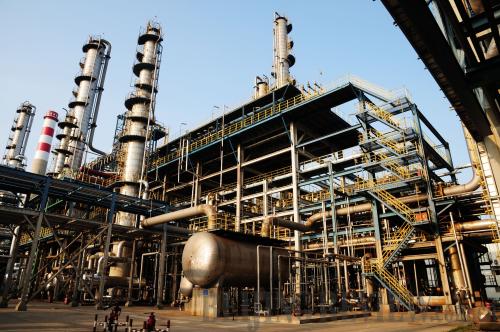|
 |
|
MONOPOLY GIANT: A Sinopec refinery in Qingdao, east China's Shandong Province. State-owned Sinopec is the country's largest oil refiner (CFP) |
The problem that private capital has difficulties accessing monopolized sectors hasn't been solved, said Zhou Dewen, Executive President of Zhejiang Federation of Private Enterprise Investment and President of the Development Promotion Association for Wenzhou Small and Medium-sized Enterprises.
According to Zhou, the Zhejiang Federation of Private Enterprise Investment has spent the better part of a decade trying to establish a bank with capital from overseas Chinese, but it's hard to get approval from the government. The federation reapplied last year after the new policy was unveiled in May 2010, but it was flatly refused.
Privately controlled companies account for less than 10 percent of total investments in sectors including transportation, storage, postal service, water conservancy and finance, according to a recent report of the ACFIC.
The Central Government has a firm hand in supporting private investment, said Chen Yongjie, Deputy Secretary General of China Center for International Economic Exchanges. Some policies have clearly pointed out the government should encourage private investment by lowering the threshold of market access and allowing private investment in more sectors such as infrastructure, public welfare and financial service.
In August 2011, the NDRC issued a regulation, which said that no government departments can set higher thresholds for private companies or private capital in administrative procedures such as registered capital, investment amount, capacity and land supply.
But those policies are usually passively implemented, said Chen.
Detailed implementation measures are expected to come out in the first half of 2012, said Zhang Hanya, Vice President of the Investment Association of China.
"Policies for sectors that have been open to private capital, such as culture, education and public health, will come out more easily and be more feasible," he said.
Monopolized sectors—finance, railways and power, for instances—can be opened gradually, said Zhang.
"For instance, rail lines for transporting coal in Inner Mongolia Autonomous Region and Shaanxi Province to Hubei and Hunan provinces in which private companies are interested can be run by private companies on a trial basis," said Zhang.
The power grid can also be partly opened, such as the wind power sector, he said.
Public utilities are considered the most difficult sector for private investment to enter. Local governments are accustomed to using their own money for public utilities construction rather than introducing private capital, said Ma Hui, Director of the Research Department of China Environment Chamber of Commerce under the ACFIC.
Therefore, some experts suggest SOEs' investment in sectors, such as public utilities and the oil industry, should be restricted.
"In the oil industry, only by restricting the number of gas stations of PetroChina and Sinopec and giving private companies favorable policies can real competition be established," said Bao Yujun, Director of the All-China Society of Private Economy Research.
The government should deepen reform in monopolized industries while lowering the threshold for private investment, said Bao.
It's urgent to open more sectors to private investment, especially when the world economy lacks growth momentum, said Li Yang, Vice President of the Chinese Academy of Social Sciences.
China's Private Economy
- At the end of February 2011, there were more than 40 million unregistered private businesses with 160 million employees.
- There were 34.06 million registered individually owned businesses with 69.82 million employees.
- There were 8.19 million privately owned enterprises with 91.84 million employees.
Email us at: lanxinzhen@bjreview.com | 